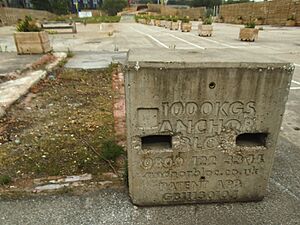Tonne facts for kids
Quick facts for kids TonneMegagram |
|
|---|---|

A one-tonne (1000-kilogram) concrete block
|
|
| General information | |
| Unit system | Non-SI |
| Unit of | mass |
| Symbol | t Mg |
| In SI units: | 1000 kg |
The tonne (pronounced "tun") is a unit used to measure how heavy something is. It's equal to 1,000 kilograms. Imagine 1,000 bags of sugar; that's how much a tonne weighs!
In some places, like the United States, people call it a metric ton. This helps them tell it apart from other "tons" that are used there, like the short ton or the long ton. A tonne is about 2,204.6 pounds.
The official scientific name for the tonne is the megagram (Mg), but "tonne" is much more common.
Contents
What is the Tonne Symbol?
The official symbol for the tonne is t. This symbol was chosen way back in 1879. It's important to use the lowercase 't' because other letters can mean different things in science. For example, 'T' is for tesla, a unit of magnetism.
The symbol 't' is not an abbreviation, so you should never put a period after it.
Where Did the Word "Tonne" Come From?
The word "ton" and "tonne" both come from an old Germanic word. This word was used in the Middle Ages to describe a large barrel, called a tun.
Imagine a big barrel, about a meter (or three feet) tall. When it was full, it could easily weigh a tonne!
The spelling tonne has been used in France since 1842. Today, it's the standard way to spell this metric mass measurement in most English-speaking countries. In the United States, they usually say "metric ton."
How Big is a Tonne?
A tonne is a very specific amount of mass. Here are some ways to understand how much it is:
- It's exactly 1,000 kilograms (kg).
- It's also 1,000,000 grams (g), which is the same as 1 megagram (Mg).
- In pounds, a tonne is about 2,204.6 pounds.
- Compared to a short ton (used in the US), a tonne is about 1.1 short tons. So, a tonne is a bit heavier than a US short ton.
- Compared to a long ton (used in the UK), a tonne is about 0.98 long tons. So, a tonne is a little lighter than a UK long ton.
Did you know that one tonne is also the mass of one cubic metre of pure water? This is true when the water is at 4 degrees Celsius, which is when water is at its densest.
Bigger Tonnes: Kilotonne, Megatonne, Gigatonne
Sometimes, when talking about very large amounts, especially in science or for big events like explosions, people use prefixes with "tonne."
| Tonnes | Grams | Equivalents | ||||
|---|---|---|---|---|---|---|
| Name | Symbol | Name | Symbol | Tonnes (t) | Short Tons (tn) | Long Tons (LT) |
| tonne | t | megagram | Mg | 1 t | 1.1023 tn | 0.98421 LT |
| kilotonne | kt | gigagram | Gg | 1,000 t | 1,102.3 tn | 984.21 LT |
| megatonne | Mt | teragram | Tg | 1,000,000 t | 1.1023 million tn | 0.98421 million LT |
| gigatonne | Gt | petagram | Pg | 1,000,000,000 t | 1.1023 billion tn | 0.98421 billion LT |
Tonnes and Energy
The "tonne of trinitrotoluene (TNT)" is a way to measure the energy of explosions, especially for things like nuclear weapons. TNT is a powerful explosive.
One tonne of TNT is roughly equal to 4.2 gigajoules of energy. A gigajoule is a huge amount of energy!
- 1 kt (kilotonne) of TNT is about 4.2 terajoules.
- 1 Mt (megatonne) of TNT is about 4.2 petajoules.
In the petroleum industry, people also use the "tonne of oil equivalent" (toe). This measures the energy released when you burn one tonne of crude oil. It's about 42 gigajoules, which is ten times more energy than a tonne of TNT!
See also
 In Spanish: Tonelada para niños
In Spanish: Tonelada para niños
- Metre–tonne–second system of units
- Orders of magnitude (mass)
- Ton
- Tonnage
- Ton (volume)
 | Misty Copeland |
 | Raven Wilkinson |
 | Debra Austin |
 | Aesha Ash |

